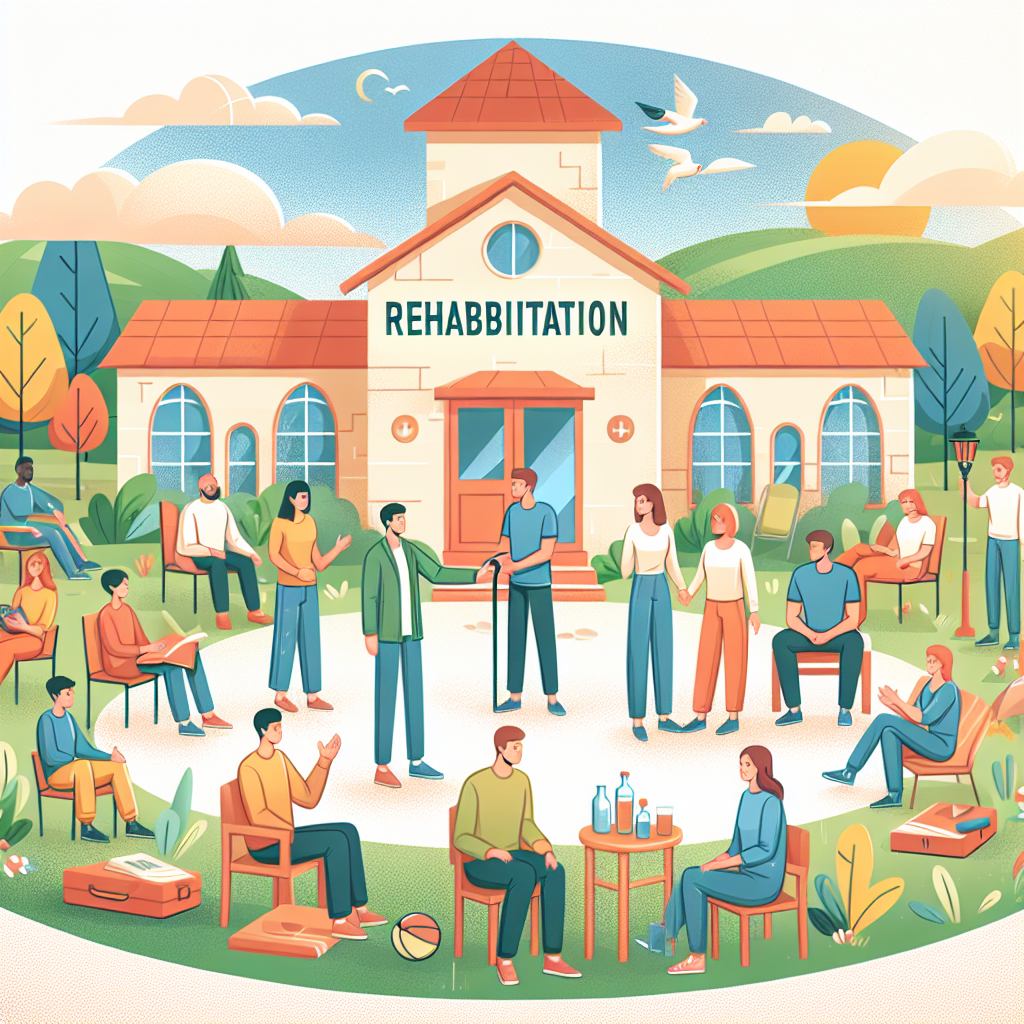-
Table of Contents
“Empower Recovery: Tailored Rehab Programs for Young Adults Battling Eating Disorders”
Introduction
Choosing the right rehab program for young adults with eating disorders is a critical decision that can significantly impact their recovery journey. Eating disorders, such as anorexia nervosa, bulimia nervosa, and binge-eating disorder, are complex mental health conditions that require specialized and comprehensive treatment approaches. Young adults, in particular, face unique challenges and developmental needs that must be addressed to ensure effective and sustainable recovery. A well-suited rehab program should offer a multidisciplinary approach, combining medical, nutritional, and psychological support tailored to the individual’s specific needs. Additionally, it should provide a safe and supportive environment that fosters personal growth, resilience, and the development of healthy coping mechanisms. By carefully evaluating factors such as the program’s treatment philosophy, staff expertise, therapeutic modalities, and aftercare support, families and individuals can make informed decisions that pave the way for successful recovery and long-term well-being.
Key Factors to Consider When Selecting a Rehab Program for Young Adults with Eating Disorders
Choosing the right rehab program for young adults with eating disorders is a critical decision that can significantly impact their journey toward recovery. As parents, guardians, or loved ones, understanding the key factors to consider when selecting a rehab program is essential to ensure the best possible outcome for the individual in need. The process can be overwhelming, but with careful consideration and a focus on the unique needs of young adults, it is possible to find a program that offers the right blend of support, treatment, and hope.
First and foremost, it is important to evaluate the credentials and expertise of the rehab program. Ensuring that the facility is accredited and staffed by qualified professionals who specialize in eating disorders is crucial. These experts should include licensed therapists, dietitians, and medical doctors who are experienced in treating young adults. Their collective knowledge and experience can provide a comprehensive approach to recovery, addressing both the physical and psychological aspects of eating disorders.
In addition to professional qualifications, the treatment approach of the rehab program is another vital factor to consider. Programs that offer evidence-based treatments, such as Cognitive Behavioral Therapy (CBT), Dialectical Behavior Therapy (DBT), and Family-Based Therapy (FBT), have been shown to be effective in treating eating disorders. These therapies not only help individuals develop healthier relationships with food but also address underlying emotional and psychological issues. Furthermore, a program that incorporates holistic treatments, such as art therapy, yoga, and mindfulness, can provide a well-rounded approach to healing.
The environment and setting of the rehab program also play a significant role in the recovery process. Young adults often benefit from being in a supportive and nurturing environment that fosters a sense of community and belonging. Residential programs that offer a home-like atmosphere can help individuals feel more comfortable and less isolated. Additionally, programs that encourage peer support and group therapy can be particularly beneficial, as they allow young adults to connect with others who are facing similar challenges, reducing feelings of loneliness and promoting mutual understanding.
Another key factor to consider is the level of family involvement in the treatment process. Eating disorders often affect not just the individual but also their family dynamics. Programs that actively involve family members in therapy sessions and provide education and support for families can help create a more supportive home environment, which is crucial for long-term recovery. Family involvement can also help address any underlying issues that may have contributed to the development of the eating disorder.
Moreover, it is essential to consider the aftercare and support services offered by the rehab program. Recovery from an eating disorder is an ongoing process, and having access to continued support after leaving the program is vital. Look for programs that offer robust aftercare plans, including outpatient therapy, support groups, and resources for maintaining healthy habits. This ongoing support can help young adults navigate the challenges of everyday life while staying committed to their recovery journey.
Lastly, it is important to consider the individual preferences and needs of the young adult. Each person’s experience with an eating disorder is unique, and finding a program that aligns with their values, interests, and comfort level can enhance their engagement and commitment to the treatment process. Encouraging the young adult to be involved in the decision-making process can also empower them and give them a sense of control over their recovery.
In conclusion, choosing the right rehab program for young adults with eating disorders involves careful consideration of several key factors, including professional expertise, treatment approaches, environment, family involvement, aftercare services, and individual preferences. By taking the time to evaluate these elements, it is possible to find a program that offers the best chance for a successful and lasting recovery, providing young adults with the support and tools they need to reclaim their lives and embrace a healthier future.
Comparing Inpatient vs. Outpatient Rehab Programs for Young Adults with Eating Disorders
Choosing the right rehab program for young adults with eating disorders is a critical decision that can significantly impact their journey toward recovery. When comparing inpatient and outpatient rehab programs, it is essential to consider various factors to determine which option best suits the individual’s needs. Both types of programs offer unique benefits and challenges, and understanding these can help families and young adults make an informed choice.
Inpatient rehab programs provide a structured and immersive environment where young adults can focus entirely on their recovery. These programs typically involve a residential stay at a treatment facility, offering 24/7 medical and psychological support. One of the primary advantages of inpatient rehab is the ability to remove individuals from their everyday environments, which may be filled with triggers and stressors that contribute to their eating disorder. By doing so, inpatient programs create a safe and controlled space where young adults can develop healthier habits and coping mechanisms.
Moreover, inpatient rehab programs often include a comprehensive range of therapies, such as individual counseling, group therapy, nutritional education, and family therapy. This holistic approach ensures that all aspects of the eating disorder are addressed, from the psychological roots to the physical health consequences. The intensive nature of inpatient treatment can lead to significant progress in a relatively short period, making it an ideal option for those with severe eating disorders or co-occurring mental health conditions.
On the other hand, outpatient rehab programs offer a more flexible approach to treatment, allowing young adults to continue their daily routines while receiving the necessary support. These programs typically involve scheduled therapy sessions and medical check-ups, which can be tailored to fit the individual’s schedule. One of the key benefits of outpatient rehab is the ability to maintain a sense of normalcy and independence, which can be particularly important for young adults who are balancing school, work, or other responsibilities.
Additionally, outpatient programs can be more cost-effective than inpatient treatment, making them a viable option for families with financial constraints. The ongoing support provided by outpatient rehab can also help young adults gradually reintegrate into their everyday lives while still receiving the guidance and encouragement needed to sustain their recovery. This continuity of care can be crucial in preventing relapse and ensuring long-term success.
However, it is important to recognize that outpatient rehab may not be suitable for everyone. Individuals with severe eating disorders or those who lack a strong support system at home may struggle to make progress in an outpatient setting. In such cases, the intensive and immersive nature of inpatient rehab may be more beneficial.
Ultimately, the choice between inpatient and outpatient rehab programs should be based on a thorough assessment of the young adult’s specific needs, preferences, and circumstances. Consulting with healthcare professionals, such as doctors, therapists, and dietitians, can provide valuable insights and recommendations tailored to the individual’s situation. It is also essential to involve the young adult in the decision-making process, ensuring that they feel empowered and committed to their recovery journey.
In conclusion, both inpatient and outpatient rehab programs offer distinct advantages for young adults with eating disorders. By carefully considering the unique needs and circumstances of the individual, families can make an informed decision that maximizes the chances of a successful and lasting recovery. With the right support and treatment, young adults can overcome their eating disorders and build healthier, more fulfilling lives.
Q&A
1. **What factors should be considered when choosing a rehab program for young adults with eating disorders?**
– Factors to consider include the program’s specialization in eating disorders, the qualifications and experience of the staff, the types of therapies offered (e.g., cognitive-behavioral therapy, family-based therapy), the level of care provided (inpatient, outpatient, residential), the program’s success rates, and the availability of aftercare support.
2. **Why is it important to choose a rehab program that offers family-based therapy for young adults with eating disorders?**
– Family-based therapy is important because it involves the family in the treatment process, which can provide crucial support and help address underlying family dynamics that may contribute to the eating disorder. This approach can improve communication, strengthen relationships, and create a supportive home environment conducive to recovery.
Conclusion
Choosing the right rehab program for young adults with eating disorders involves considering several critical factors, including the program’s specialization in eating disorders, the qualifications and experience of the treatment team, the availability of comprehensive and individualized treatment plans, and the inclusion of family involvement and support. Additionally, the program should offer a safe and supportive environment, evidence-based therapies, and aftercare planning to ensure long-term recovery. By carefully evaluating these elements, families can select a rehab program that best meets the unique needs of the young adult, thereby increasing the likelihood of successful treatment outcomes.



